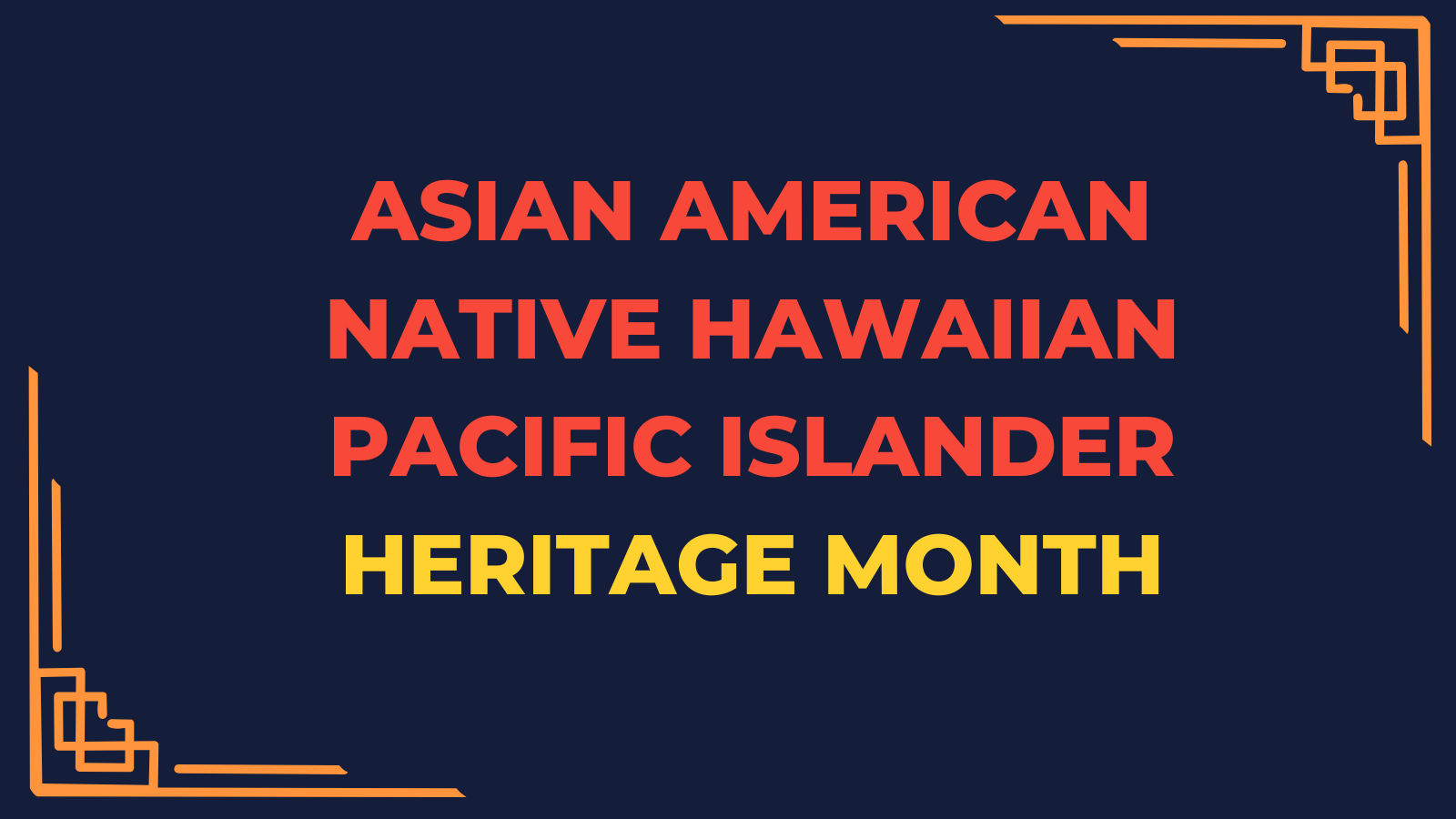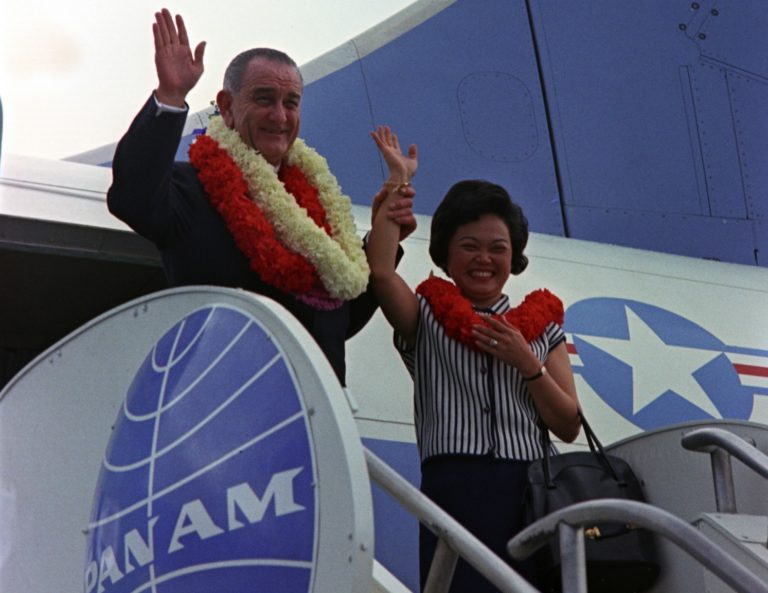Image: Rep. Patsy Mink with President Lyndon B. Johnson, 1966 As the Asian American Pacific Islander…
Celebrating Asian American and Pacific Islander Heritage Month

May is Asian American and Pacific Islander (AAPI) Heritage Month, and this month we’re celebrating by honoring the AAPI women who have blazed trails in politics, at every level. Our friends at the Center for American Women and Politics (CAWP) have broken down the numbers, and we’re looking back on some of these AAPI women leaders throughout US history.
Mayors
Historically, 7 Asian American or Pacific Islander women have served as mayor of one of America’s 100 most populous cities, and 5 of them currently still hold that office. That list includes Sheng Thao in Oakland, CA; Michelle Wu in Boston, MA; Farah Khan in Irvine, CA; Karen K. Goh in Bakersfield, CA; and Lily Mei in Fremont, CA.
The first Asian American woman mayor of a major US city was Eunice Sato, who served as the mayor of Long Beach, CA from 1980-1982. Before she began her career in politics, Sato worked as a teacher in Michigan and in Yokohama, Japan. She moved to Long Beach in 1956, and was elected to the city council in 1975. After completing her time as Mayor of Long Beach, she went on to be appointed by President George H. W. Bush to the U.S. National Advisory Council on Educational Research. On being Japanese American and working in politics, Sato said: “I am convinced that if one community is too narrow and prejudiced to have me because of my cultural background, there will be another somewhere that believes in true democracy and desires to see it in action as well as in words.”
State Legislature
In 2022, there were 78 AAPI women serving at the state legislature level. 21 of these women are serving as a state senator, and 57 are serving in a state house or a state assembly. According to CAWP, AAPI women make up 1% of all state legislators, and 3.3% of all women state legislators in the US.
The first AAPI woman elected to a state legislative office was Patsy Takemoto Mink, who served in Hawaii’s state senate from 1963-1964. In 1964, Mink then went on to become the first woman of color, and the first Asian American woman to be elected to Congress. During her time in Congress – 12 terms total – she co-wrote the Title IX Amendment of the Higher Education Act which prohibited sex-based discrimination at schools. She also wrote bills like the Early Childhood Education Act and the Women’s Educational Equity Act. In 1972, she became the first Asian American woman to run for President.
Statewide Elective Executive Office
There are currently 4 AAPI women holding statewide elective executive office seats; 2 lieutenant governors and 2 treasurers. According to CAWP, AAPI women make up 1.3% of all statewide elective executives, and 4.1% of all women statewide elective executives. Historically, 12 AAPI women have held statewide elective executive offices. This list includes current VP and former California Senator, Kamala Harris; and current Hawaii Senator, Mazie Hirono.
The first, and only, AAPI woman to serve as Governor of a US state was Nikki Haley, who served as South Carolina’s Governor from 2011-2017. Haley was born Nimrata Nikki Randhawa to an Indian Punjabi American Sikh family in South Carolina. She began her political career in the SC House of Representatives, where she served from 2005-2011, becoming the first Indian-American to hold office in South Carolina. After her time as Governor, she went on to serve as the United States Ambassador to the UN from 2017-2018, making her the first Indian American to hold a presidential cabinet position.
Congress
There are currently 10 AAPI women serving at the Congressional level – 2 in the US Senate, and 8 in the US House of Representatives. According to CAWP, AAPI women make up 1.9% of all voting members of Congress, and 6.7% of all women voting members of Congress. Historically, 16 AAPI women have served in Congress – 3 in the US Senate, and 15 in the House of Representatives (Tammy Duckworth and Mazie Hirono served in both). That is only 0.1% of all members of Congress to-date, and 3.8% of all women who have served in Congress to-date.
The first AAPI woman, and the first Asian-born immigrant, to be elected to the U.S. Senate was Mazie Hirono. She has been serving as Hawaii’s junior US Senator since 2013. Prior to her role as senator, Hirono served as a member of Hawaii’s House of Representatives from 1981-1995; was Hawaii’s lieutenant governor from 1994-2022; and was a member of the House of Representatives for Hawaii’s 2nd Congressional District from 2007-2013. On her experience in politics, Hirono says, “It is a privilege to do my very best for Hawaii in the U.S. Senate. With my background and experiences, I never forget where I came from or who I fight for and why.”
Federal Elective Executive Office
Only 1 AAPI woman has ever held federal elective executive office – our current Vice President, Kamala Harris. She was also the first woman, the first Black person, and the first South Asian person to be elected to this level of government.
Prior to serving as the Vice President, Harris served as the District Attorney of San Francisco; the Attorney General of California; and a US Senator representing California, making her the first South Asian American to serve in the Senate. On being a trailblazer, Harris has said, “My mother would look at me and she’d say, ‘Kamala, you may be the first to do many things, but make sure you are not the last.’”
As we honor Asian American and Pacific Islander Heritage Month here at Gender on the Ballot, we’ll be looking back on the work these trailblazers have done, and continue to do, to ensure AAPI voices are heard at all levels of government.






